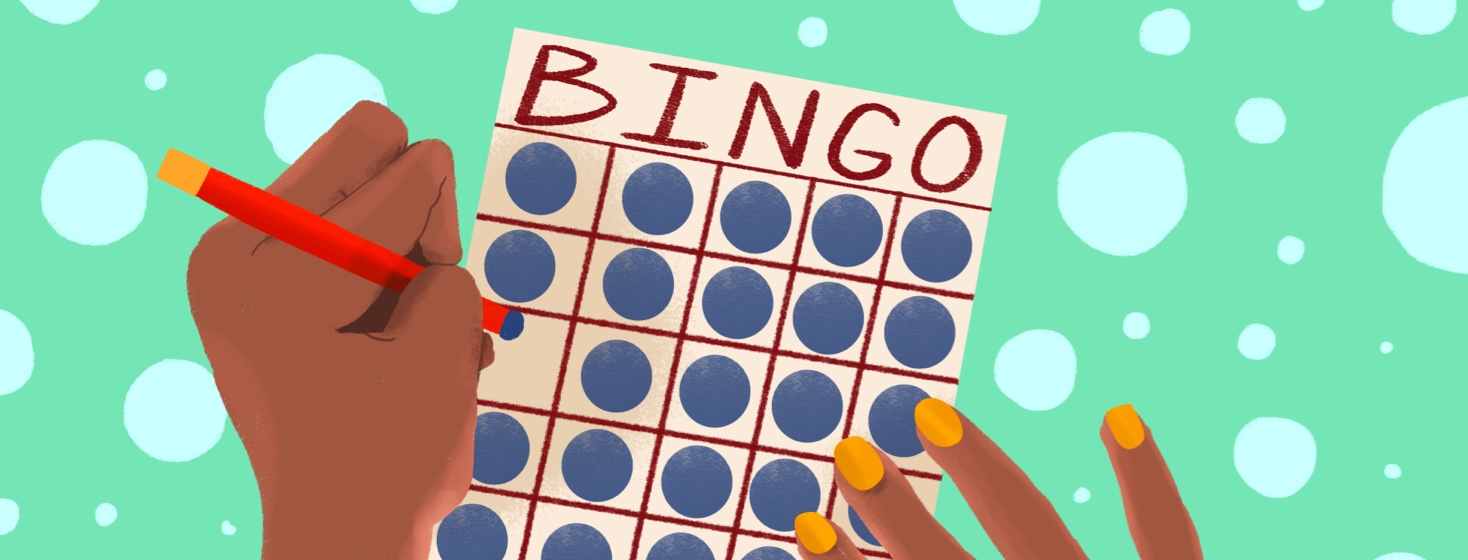Blood Cancer Was Not on My Bingo Card
When I was a kid, I used to play at being a writer. My friend down the street and I would create little books that I’m sure were brilliant (insert sarcasm). I would write the text and she would draw the pictures.
With a different friend, as I got a bit older, we would record our own “60 Minutes” segments using her tape recorder. We would take turns being the reporter or interviewee, sometimes portraying celebrities.
This practice was essentially preparing me for my eventual career as a journalist where writing and interviewing became a part of my daily existence (and still is!).
No rehearsal for my role as a blood cancer patient
However, there was one role I never expected or practiced. Using a popular saying, blood cancer was not on my Bingo card.
Therefore, without preparation or rehearsal of any kind, I had to become a leukemia patient.
How is someone supposed to act when they are diagnosed with chronic myeloid leukemia as I was? Am I required to behave in a certain way or do particular things in my specific role?
Not knowing how to react
It was more than nine and a half years ago when my new hematologist/oncologist confirmed to me I had blood cancer.
Looking back, I find it difficult to remember my exact reaction. I did not ask very many condition-related questions at the time. That is not like me. Unlike now, when I bombard doctors with questions, I vaguely recall sitting there in the room with my friend and just listening.
And listening.
The doctor was very scientific in his long explanations, drawing chromosomes on a piece of paper. Chromosomes 9 and 22, after all, translocate to form an abnormal gene, BCR ABL.
He scribbled away other things—one of which was a timeline showing the then four types of drugs available called tyrosine kinase inhibitors (TKIs) to try to treat CML. At the end of the line he wrote, “stem cell transplant,” and I do have a vivid memory of him pointing at it as the “last resort” measure, adding, “I do these transplants.”
I may have thought or said, “I’m not doing that,” even though I had no idea what that entailed.
After all, blood cancer was not on my Bingo card and neither was its treatments.
Not understanding the role
Because of my state of largely stunned silence, I did not ask how one acts as a leukemia patient.
At the time, I am not sure I registered the gravity of the situation.
Uppermost on my mind was telling this specialist doctor in a new, nearby city about my primary doctor back in my former hometown about 90 minutes away.
I had tried to tell this primary for more than a year that something was terribly wrong with me only to be blown off and my concerns dismissed.
“I was right,” was all I could think to say and think about the situation.
When I harped on that point, I do vividly remember the doctor asking my friend to leave the room. He then walked over to me and said, “Let it go,” closer to my ear.
Then, just as abruptly, he walked back to the door and let her in again.
Not asking for insight
Instead of feeling bewildered and indignant, maybe I should have asked for advice on how to become a leukemia patient much like I had prepared for my life’s work.
Blood cancer is my life’s work in some ways now.
By that I mean, I must battle daily unpleasant side effects and very limited mobility these days. I need to balance medical appointments and other ailments with my “role” as an individual with blood cancer. I work at surviving and carrying on each day.
I have had a lot of practice at it now, and my portrayal has undergone several iterations.
What started out as a denier persona has transformed into an outspoken person who hopefully is an advocate for people who also did not have blood cancer on their Bingo cards.
Although there is no exact way to practice for it, I can retroactively try to educate those around me about CML and try to spread the word.
(Yesterday, actually, that same hematologist/oncologist told me (somewhat jokingly) I could run a class on CML).
Whatever I do, I hope it helps all of us feel less under-rehearsed.

Join the conversation